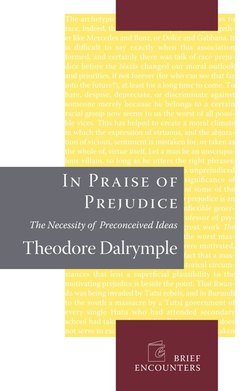Читать книгу In Praise of Prejudice - Theodore Dalrymple - Страница 9
На сайте Литреса книга снята с продажи.
Оглавление4
Why We Prefer the History of Disaster to that of Achievement
IT IS HARDLY a matter of dispute that the Whig interpretation of history is not much in favor nowadays, even in the sphere in which it is most plausible, and at least as plausible as any other interpretation. The crime-and-folly view is much preferred. Miss Berlinski confines her historiography to European history, in order to contrast it with American history, but it would not be so very difficult to construct an American history along similar lines. From the historiographic point of view, the expansion of European settlement was nothing but the despoliation of the original inhabitants and owners of the land; the War of Independence was sparked by an awareness of the long-term significance of Lord Mansfield’s ruling that a slave was free as soon as he reached British soil, which meant that slavery had no long-term future under British rule; and the continuing and unabated travails of blacks in America establish beyond all reasonable doubt the hypocritical nature of the founding philosophy, which is just a cloak for economic and racial privilege. As for Asia and Africa, the task of writing a history that is the mirror-image of the Whig interpretation would be not difficult at all.
But perhaps the most startling example of the crime-and-folly school of historiography is that of Australia. This vast country is so endowed with everything that the population of a country could reasonably want that it is often called by its own inhabitants the Lucky Country. Actually, luck has little to do with it; no one refers to Argentina, similarly endowed, as a lucky country. But a country whose problems, by comparison with those of all other countries, are minor, and disproportionately caused by the inherent and inescapable difficulties of human existence (or Original Sin, if you prefer), rather than by defective political arrangements, does not necessarily please the intellectuals, who are left with nothing, or nothing very much, to think about and rectify.
It was therefore a godsend—to Australian intellectuals, that is—when it was discovered, or rather asserted, that the country was founded upon the worst of all possible acts, namely genocide. Here, at last, was something for Australian intellectuals really to get their teeth into. The Tasmanian aborigines died out about sixty years after the settlement of the island by the British, and the historians claimed that this was the result not of accident, but of deliberate policy. Present-day Australians, therefore, are little better than very rich men whose fortunes were founded upon a great crime, which Balzac considered to be typical of the whole class of rich men. Australians are leading their happy and prosperous lives on a foundation of corpses; penitential angst is therefore in order.
The Tasmanian genocide was soon accepted worldwide as an indisputable fact. Indeed, whenever a journalist anywhere needs a list of genocides, the Tasmanian rarely fails to appear in it. When, therefore, the Australian historian, Keith Windschuttle, published an enormous and very detailed book examining the evidence for the genocide, and found such evidence had been misconstrued where it had not been entirely fabricated, you might have supposed the world in general, and Australia in particular, would have breathed a sigh of relief: here was one genocide the less with which to upbraid humanity. But you would have been mistaken. Screams of pain rent the air and the author was reviled. Irrespective of the historical truth of the matter (and as far as I am aware, Mr. Windschuttle’s most serious claims have not been refuted), it was clear that a sector of, if not the entire, Australian intelligentsia actually wanted there to have been a genocide. Why?
I pass over in silence the fact that the great Australian Original Sin might lend power and importance to the intellectual episcopacy (ably assisted by its attendant bureaucracy) of the Church of Verbal Atonement. The love of truth, while it exists, is generally weaker than the love of power. Rather, I refer to the psychological effects and moral consequences of the crime-and-folly version of history, so amply justified by the Tasmanian genocide.
If history is indeed but the record of extreme nastiness, then we have nothing to learn from it except that we, who of course are people of unalloyed good will, must do things—everything—differently in the future. The moral reflections of people in the past were nothing but a fig leaf for their own misbehavior on a grand scale—sheer hypocrisy, in fact. In the words of Doctor Johnson, they discoursed like angels but behaved like men, and they honored every one of their precepts more in the breach than in the observance. In the absence of any religious conception of Original Sin (by comparison with an historical conception of a foundational injustice, such as the Tasmanian genocide), by means of which the imperfectability of man could be accepted, without at the same time absolving him of the need individually to strive for virtue, either perfect moral consistency or complete amoralism becomes the standard of judgment. Of course, those who still believe in the religious conception of Original Sin, even as a metaphor, are now very few, at least among the class of people who set the intellectual and moral tone of society as a whole.
Whether amoralism or moral perfectionism is chosen as the standard, one great advantage accrues: it frees us from the weight of the past. Free of any inherited taint, we have not only the right, but the duty to work everything out for ourselves, without reference to what anyone else has ever thought. We are moral atoms in motion through a vacuum, to whom the past means nothing, or at least nothing positive or worthy of emulation, or even maintenance. It is rather something to be avoided at all cost, lest it infects one with its crimes and follies.
